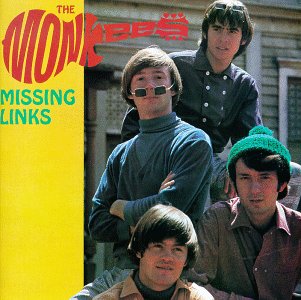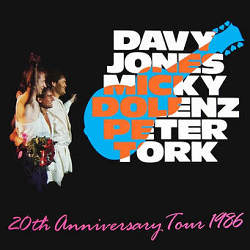
The Monkees were an American pop rock band formed in Los Angeles in the mid-1960s. The band consisted of Micky Dolenz, Davy Jones, Michael Nesmith, and Peter Tork. Spurred by the success of the television show of the same name, the Monkees were one of the most successful bands of the 1960s. With international hits, four chart-topping albums and three chart-topping songs, the band sold more than 75 million records worldwide.

George Michael Dolenz Jr. is an American actor, musician, TV producer and businessman. He was the drummer and one of two primary vocalists for the pop-rock band the Monkees, and a co-star of the TV series The Monkees (1966–1968).

Pisces, Aquarius, Capricorn & Jones Ltd. is the fourth album by the Monkees. It was released on November 6, 1967, during a period when the band exerted more control over their music and performed many of the instruments themselves. However, although the group had complete artistic control over the procceedings, they invited more outside contributions than on their previous album, Headquarters, and used session musicians to complement their sound. The album also featured one of the first uses of the Moog synthesizer in popular music. Pisces, Aquarius, Capricorn & Jones Ltd. sold over three million copies. It was the band's fourth consecutive album to reach No. 1 on the U.S. Billboard 200.

The Monkees is the debut studio album by the American band the Monkees. It was released on October 10, 1966 by Colgems Records in the United States and RCA Victor in the rest of the world. It was the first of four consecutive U.S. number one albums for the group, taking the top spot on the Billboard 200 for 13 weeks, after which it was displaced by the band's second album. It also topped the UK charts in 1967. The Monkees has been certified quintuple platinum by the RIAA, with sales of over five million copies.

The Monkees Present is The Monkees' eighth album. It is the second Monkees album released after the departure of Peter Tork and the last to feature Michael Nesmith until 1996's Justus.

Changes is the ninth studio album by the Monkees. The album was issued after Michael Nesmith's exit from the band, leaving only Micky Dolenz and Davy Jones to fulfill the recording contract they had signed in the mid-1960s. Changes was their last new album for Colgems Records and the group's last album of all new material until Pool It!, released in 1987.

Pool It! is the tenth studio album by American pop rock band the Monkees, released in August 1987 by Rhino Records. It was the first Monkees studio album of new material since Changes in 1970 and the first Monkees album to feature Peter Tork since the 1968 Head soundtrack.

The Birds, the Bees & the Monkees is the fifth studio album by the Monkees, and their first album released after the cancellation of their TV show. Released in April 1968, it was the first Monkees album not to reach Billboard's number one, peaking at No. 3 on the U.S. charts. It was also their first album to miss the UK charts altogether, with their four previous efforts all having reached the top ten. The album has sold over a million copies.

Head is the sixth studio album by the Monkees, and the soundtrack to the film of the same name. Released in 1968, the album primarily consists of musique concrète pieces assembled from the film's dialogue. The six new songs encompass genres such as psychedelic music, lo-fi, acid rock and Broadway theatre.

Justus is the eleventh studio album by the Monkees. The album was recorded in celebration of their 30th anniversary and released on October 15, 1996. It features the return of Michael Nesmith to the group.

Instant Replay is the seventh studio album by the Monkees. Issued 11 months after the cancellation of the group's NBC television series, it is also the first album released after Peter Tork left the group and the only album of the original nine studio albums that does not include any songs featured in the TV show.
"Circle Sky" is a song written by Michael Nesmith which appeared on The Monkees' sixth album, the Head soundtrack, and also in the film Head as a live concert performance.

"Last Train to Clarksville" is a song by American rock band the Monkees. It was released as the band's debut single on August 16, 1966, and was later included on the group's self-titled album, which was released on October 10, 1966. The song, written by Tommy Boyce and Bobby Hart, was recorded at RCA Victor Studio B in Hollywood on July 25, 1966, and was already on the Boss Radio "Hit Bounds" playlist on August 17, 1966. The song topped the Billboard Hot 100 for the week ending November 5, 1966. Lead vocals were performed by the Monkees' drummer, Micky Dolenz. "Last Train to Clarksville" was featured in seven episodes of the band's television series, the most for any Monkees song.

Missing Links is a compilation album of rare and previously unreleased songs by the Monkees, issued by Rhino Records in 1987. It is the first volume of a three-volume set, followed by Missing Links Volume Two in 1990 and Missing Links Volume Three in 1996.

Missing Links Volume Three is a compilation album of rare and previously unreleased songs by The Monkees issued by Rhino Records in 1996. It is the third and final volume of a three-volume set, preceded by Missing Links in 1987 and Missing Links Volume Two in 1990.

Missing Links Volume Two is a compilation album of rare and previously unreleased songs by the Monkees, issued by Rhino Records in 1990. It is the second volume of a three-volume set, preceded by Missing Links in 1987 and followed by Missing Links Volume Three in 1996.

20th Anniversary Tour 1986 is a live album by the Monkees recorded during their 20th anniversary tour in 1986. To date, it is the only known complete concert recorded during this era. The recording was available at 1987 tour stops in double-LP and cassette formats, though a planned 1988 retail release by Rhino Records was ultimately scrapped. The record credited the artists as Davy Jones, Micky Dolenz, Peter Tork to avoid paying royalties to Arista Records who owned the Monkees trademark at the time, though the band's logo is visible on the sleeve. A limited-edition CD was released in 1994 under the title Live! by the group's fan club in Nashville, and was sold at concerts during their 1996 tour.

Tear Drop City is a single by The Monkees released on February 8, 1969 on Colgems #5000 recorded on October 26, 1966. The song reached No.56 on the Billboard chart, no.37 on cash box. The lyrics are about a man who feels low because his girlfriend has left him. Written by Tommy Boyce and Bobby Hart, it was the first single The Monkees released as a trio. Micky Dolenz performed the lead vocal. Boyce and Hart produced and arranged the song.

Good Times! is the twelfth studio album by American pop rock band the Monkees. Produced primarily by Adam Schlesinger, the album was recorded to commemorate the band's 50th anniversary. It is the first Monkees studio album since Justus (1996), marking the longest gap between releases to date, and the first since the death of Davy Jones. The album features surviving Monkees Micky Dolenz, Michael Nesmith, and Peter Tork, as well as a posthumous contribution from Jones.
"Words" is a song written by Tommy Boyce and Bobby Hart and released by the Monkees. An early version by the Leaves appeared on their 1966 album Hey Joe. The Monkees first recorded the song for their second album, More of The Monkees, in August 1966 under the supervision of Boyce and Hart. While this version went unreleased until the 1990 compilation Missing Links Volume Two, it was featured in the 10 April 1967 episode of The Monkees "Monkees, Manhattan Style". A new version of the song was made to be the B-side of "Pleasant Valley Sunday" in 1967, now produced by Chip Douglas.


















